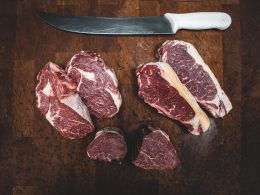Are you looking to build strong muscles and achieve a healthy body? Look no further than protein! Protein is an essential nutrient that plays a vital role in muscle growth and repair. Whether you’re an athlete or simply looking to improve your overall health, incorporating enough protein into your diet is key. In this blog post, we’ll explore the different types of protein, their unique benefits, and how you can easily add more protein to your daily meals. So let’s dive in and discover why protein is the secret ingredient for building a stronger, healthier you!
What is protein?
Protein is a macronutrient that is essential for the growth and repair of tissues in our body. It’s made up of amino acids, which are the building blocks of protein molecules. There are 20 different types of amino acids, some of which our bodies can produce on their own while others must be obtained through food.
Protein can be found in both animal and plant-based sources such as meat, dairy products, nuts, seeds and legumes. Animal-based sources like beef or chicken contain all nine essential amino acids required by our bodies while most plant-based sources lack one or more essential amino acid.
Aside from muscle growth and repair, protein also plays a crucial role in various bodily functions including enzyme production, hormone regulation and immune system support. Protein deficiency can lead to serious health problems such as muscle wasting, weakened bones and impaired organ function.
Understanding what protein is and why it’s important for our health can help us make informed choices about what we eat to ensure we get enough protein into our diets every day.
The different types of protein
When it comes to protein, not all sources are created equal. There are different types of protein that offer varying benefits for our bodies.
One common type is whey protein, which is derived from milk and quickly absorbed by the body. It’s often used in supplements and can help with muscle building and recovery after exercise.
Another type is casein protein, also found in milk but digested more slowly than whey. This makes it a good option for a sustained release of amino acids throughout the day or night.
Plant-based proteins have been gaining popularity in recent years, including options like pea, soy, and rice protein. These sources offer great alternatives for those who avoid dairy or animal products.
Egg white protein is another popular choice as it contains all essential amino acids needed for muscle growth and repair.
Ultimately, choosing the right type(s) of protein depends on individual needs and preferences. Incorporating a variety of sources into your diet can ensure you’re getting all the necessary nutrients your body needs to thrive.
The benefits of protein
Protein is an essential nutrient that provides numerous benefits for our bodies. One of the primary benefits is muscle growth and repair. When we exercise, we cause micro-tears in our muscles, which need to be repaired through protein synthesis. Consuming adequate amounts of protein can speed up the recovery process and help us build stronger muscles.
Protein also helps control hunger and appetite by keeping us feeling full for longer periods. This makes it an effective tool for weight loss or maintenance goals since it reduces the likelihood of overeating or snacking on unhealthy foods.
Another benefit of protein is its impact on bone health. Adequate consumption of protein has been linked to increased bone density, making it a critical nutrient for those at risk of osteoporosis or other bone-related issues.
In addition to these physical benefits, consuming enough protein can have positive effects on mental health as well. Protein contains amino acids that are necessary for neurotransmitter production, which regulates mood and cognitive function.
Consuming high-quality sources of protein such as lean meats, fish, eggs and plant-based options like soybeans can provide additional nutrients like iron and vitamin B12 that support overall health.
Including adequate amounts of high-quality proteins in your diet can provide numerous benefits beyond just muscle building – from controlling hunger to supporting brain function – making it a crucial component in achieving optimal health.
How to get enough protein in your diet
Getting enough protein in your diet is crucial for building strong muscles and maintaining a healthy body. But how do you make sure you’re getting enough?
First, understand that not all sources of protein are created equal. Animal-based proteins like chicken, fish, and beef are complete proteins meaning they contain all nine essential amino acids our bodies need to function properly. Plant-based proteins like beans, nuts, and grains may be incomplete but can still provide a good source of protein when combined with other plant-based foods.
Next, aim to incorporate at least one source of high-quality protein into each meal or snack throughout the day. This could include eggs at breakfast, Greek yogurt as a mid-morning snack, grilled chicken on top of your salad for lunch or salmon for dinner.
If you’re struggling to get enough protein from whole food sources alone consider incorporating a high-quality protein supplement like whey powder or pea-protein powder into your daily routine.
Remember that while getting enough protein is important it’s also important to maintain balance in your overall diet by including plenty of fruits and vegetables along with adequate amounts of carbohydrates and healthy fats.
Conclusion
To sum it up, protein is an essential nutrient that plays a crucial role in building strong muscles and maintaining a healthy body. It provides the necessary amino acids needed for muscle growth and repair, as well as other important functions in the body.
There are different types of protein sources to choose from, including animal-based and plant-based options. Choosing a variety of protein-rich foods can ensure you’re getting all the essential amino acids your body needs.
Making sure you’re consuming enough protein each day can be achieved through incorporating high-protein foods into your diet, such as lean meats, fish, eggs, beans, nuts, and seeds. Protein supplements may also be an option for those who struggle to meet their daily requirements through food alone.
Remember that while protein is important for building strong muscles and maintaining overall health, it should not be consumed excessively. A balanced diet with appropriate portions of all nutrients is key to achieving optimal health.
Incorporating adequate amounts of protein into your diet along with regular exercise can help you achieve your fitness goals and maintain good health over time. So go ahead – fuel yourself with some delicious high-protein meals today!












